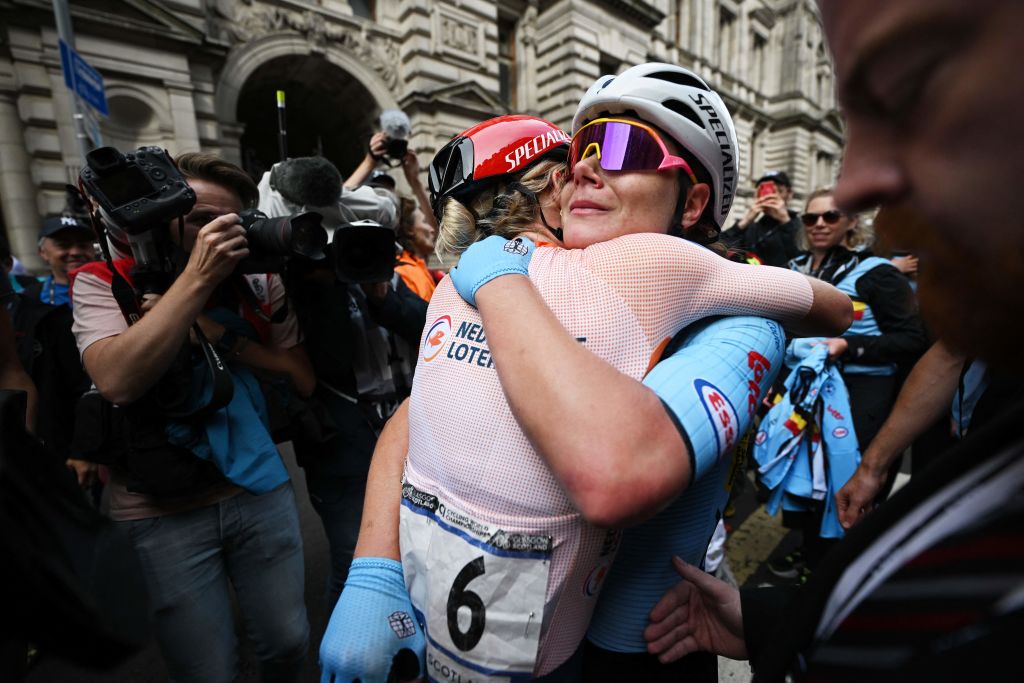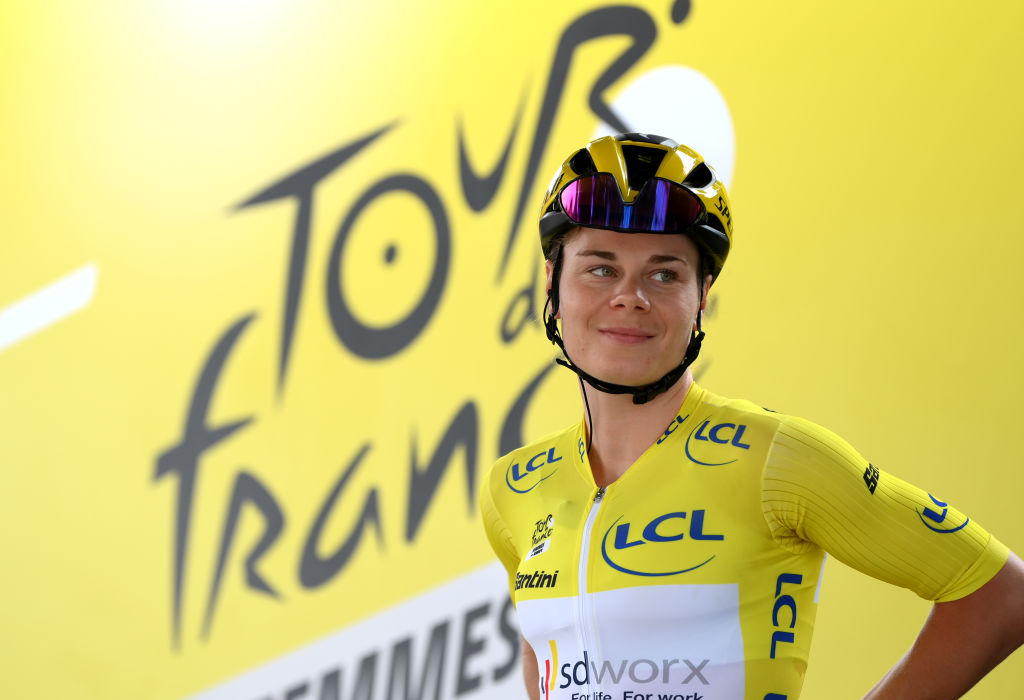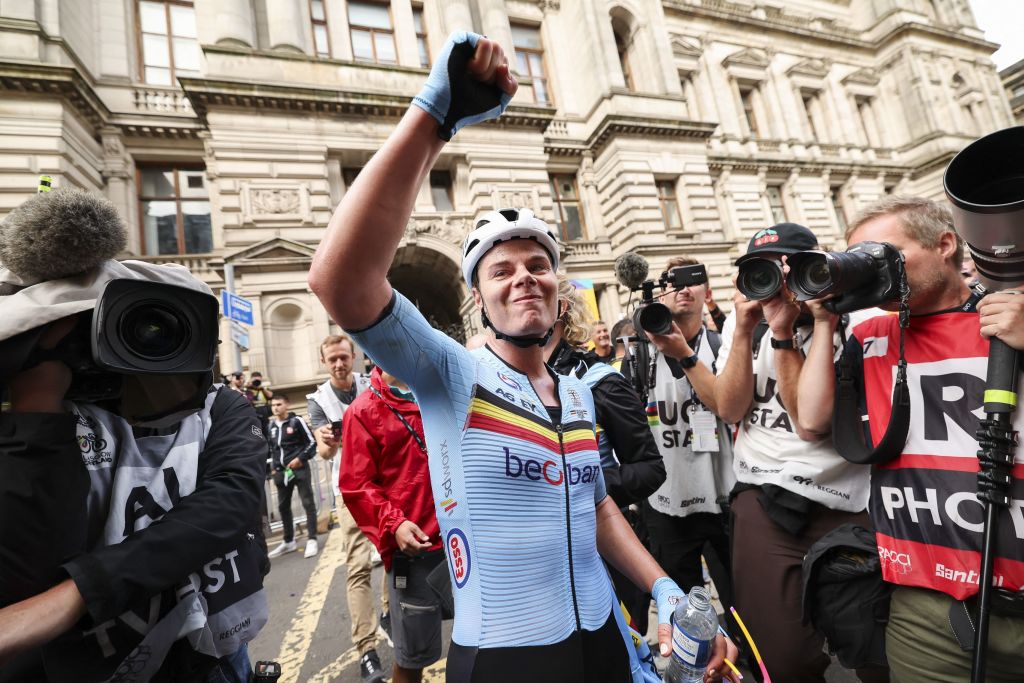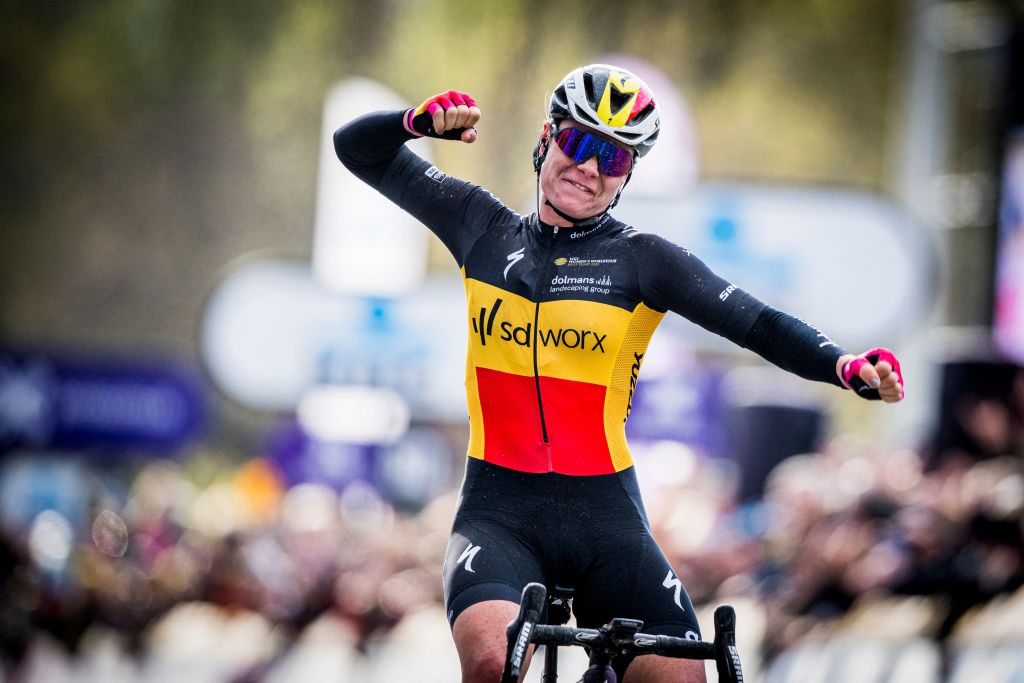Loss and triumph - Lotte Kopecky ends emotional year in rainbows
'I don’t know what keeps me pushing'- Belgian opens up about family tragedy, winning three world titles, and inspiring a new generation

Lotte Kopecky rarely reveals emotions, highs or lows, publicly, but the tears that streamed down her cheeks after winning her third rainbow jersey at the Glasgow Worlds gave us all a glimpse, and perhaps some understanding, into just how difficult her season has been and how much she has had to overcome on her path to becoming the best cyclist in the world.
“It’s been an amazing year but also a hard year. I don’t know what keeps me pushing," said Kopecky, who paused for several moments between words and sentences as she wiped tears from her eyes and thought about what to say to the press.
There was a sense of triumph, relief, loss and sadness all in one short but honest statement.
It is now widely known that Kopecky's older brother Seppe died suddenly and unexpectedly in March. He was 29 years old. He raced as a junior and then for seven years, and he was an inspiration for Kopecky's highly successful career.
She would have been forgiven for taking time away from competition following her family's tragedy this spring, but she lined up at Nokere Koerse just days later and smashed the peloton taking a solo victory. Her SD Worx team requested that the media and public respect her privacy and let her continue to race.
Everyone grieves in their own way.
"I was tremendously strong. It seemed like we were riding together. I hope I was able to make my brother proud. The past few days weren't easy, but there's no point in letting my head hang down and sitting at home on the sofa. I am someone who needs to be able to take my mind off things," Kopecky said following her brother's death.
Get The Leadout Newsletter
The latest race content, interviews, features, reviews and expert buying guides, direct to your inbox!
She repeated similar feelings in the post-race press conference following her victory in the road race in Glasgow.
"It's hard to really answer this question. It's been a hard year, but I've also been working really hard. I mean, already for years, but this winter was a really hard winter," she answered a journalist's question on the subject.
"It can go two ways; you can just stay home, or you just get out and get the work done. I chose the second."
The form of her life

Since March, Kopecky has gone on to secure 11 victories on the road, including the Tour of Flanders, Lotte Thüringen Ladies Tour, and double road and time trial national titles in Belgium.
But perhaps her most impressive block of racing this year was at the Tour de France Femmes, where she won the opening stage, wore the yellow jersey for six days, climbed with the best to the summit of the Col du Tourmalet, and then stormed to third place in the time trial in Pau.
She closed out the eight-day race by winning the green points jersey and taking second overall behind her SD Worx teammate Demi Vollering.
The performance stunned the cycling world and absolutely verified her capacity as a cyclist across flats, hilly and mountainous terrain in time trials and added to her already proven world-class pedigree on the track.
She carried the form of her life into the first-ever combined World Championships, winning three of the four world titles she pursued in the Elimination Race, Points Race, and then taking a hard-fought solo victory in the road race. She also earned a bronze medal in the Omnium.
"It really means a lot to me; it’s a dream come true. I hope to enjoy it and ride in those rainbows next year," Kopecky said, elaborating on how she handled training for multiple disciplines and the important changes she has made to her lifestyle that has led to success.
"It's years of progress. I think. I train myself. I listen well to my body, how it feels what kind of physical training I need. I think I just found a very good balance between training and having more fun on the bike," she said.
"The mental part where before it was always bike, bike, bike. But in the last two years, I've been like, 'I really want to be good on the bike, but I also want to feel good off the bike.' I think that's something that really helped me grow as a person."
'I'm stronger this year'

Starting the elite women's 154.1km race from Loch Lomond to Glasgow as the overwhelming favourite meant that once the selection had formed, those among the chase behind solo escapee Elise Chabbey (Switzerland) refused to work with the Belgian.
Live television footage from the race showed Kopecky's attempts to motivate the chase go unanswered, as Lizzie Deignan (Great Britain), Demi Vollering and Annemiek van Vleuten (Netherlands), Cecilie Uttrup Ludwig (Denmark), Christina Schweinberger (Austria) and Chabbey's teammate Marlen Reusser did not respond.
As Kopecky's frustration grew, so did her efforts to spring away from the chase in the closing laps to try to catch Chabbey. "I was not understanding how they were racing, and was like, 'Just start riding and get to [Elise Chabbey] and then restart again,'" Kopecky said.
"As long as we were behind, we were riding for second. And we all know how good of a rider Chabbey is. Yeah, it was just annoying that when I went, they could all follow the attacks, but then they did not take over anymore. It was pretty annoying and frustrating."
Kopecky also understood that her rivals' tactics go with the territory of being the overwhelming favourite and so the marked rider in the peloton.
"I knew I was the favourite for this race. But then, yeah, I can't change anything about it. So I can start to get stressed and go into a downward spiral. It's just how it is. It's not something that [has happened] the first time this year, and so the more you get into these situations, the more you get used to it," Kopecky said.
She only felt sure of her win after she distanced Uttrup Ludwig on the Scott Street ascent and then crested the final steep kick over Montrose Street alone with time to savour her victory as she crossed the line.
"It was pretty painful because the race was also exhausting. Every time you had to give it all on the steep climbs, and I was not sure. Once I was over the final climb, and there were 1.6km to the finish, and I was like, just stay upright," she said.
Asked to compare the road race in Glasgow to last year's in Wollongong, where Van Vleuten out-played the peloton with a last-kilometre winning attack that left Kopecky disappointed with the silver medal, she said she wasn't as strong last year and that outcome was based more on tactics.
"I wasn't as strong last year. It came down to circumstances that I got into the position to race for the title [in 2022]. Then Annemiek went in the final kilometre, and it was just a very smart move. We just hesitated, and it was just our own fault," Kopecky said.
"Today, I felt really good. And I also think that I was one of the strongest riders in the race. I really feel like I've heard this, and not just because of how the race was going tactically."
The Kopecky effect

Kopecky became the first Belgian woman to win the elite road race title since Nicole Vandenbroeck in 1973, and before that, Yvonne Reynders won the world titles in 1959, 1961, 1963, and 1966.
"I met [Yvonne Reynders] a few times, and she's a very nice lady," Kopecky said.
Kopecky's popularity across Belgium and the global cycling community has risen alongside her trajectory in professional cycling, which has skyrocketed over the last four seasons.
Since joining the Women's WorldTour with Liv Racing in 2021 before moving to SD Worx in 2022 through 2024, she has become one of the strongest women in the peloton.
Her career highlights in that short span of time include but are not limited to two victories at the Tour of Flanders and wins at Omloop Het Nieuwsblad and Strade Bianche, stages at the Tour, Giro and Vuelta. She has also won overall titles at Thüringen Ladies Tour and Lotto Belgium Tour and finished second overall at the Tour de France Femmes.
She hopes her success translates into the continued growth of women's cycling in Belgium. "We can see in the last year; we are making progress that our younger riders are getting stronger and stronger."
Her success over the last four seasons has already had a notable impact on the rise of junior women, U17 (15-16 years old) and U19 (17-18 years old), registering for a licence at the Cycling Vlaanderen federation.
According to Anne-Laure Gheerardyn, Women's Cycling Coordinator at Cycling Vlaanderen, in April, the number of women who are 18 years old or younger has increased nearly four times the amount since 2020, a total expected to rise again in 2023. She attributed this growth, in part, to the Kopecky effect.
"We will not see the results of this [Worlds victory] until between now in five years, but you can see some development. I just hope I can inspire a lot of girls with this, and they start to dream," Kopecky said.
On a personal level, Kopecky said she has indeed noticed her fan-base rise in Belgium, especially after her victory at the Tour of Flanders and with the introduction of the Tour de France Femmes last year.
Asked what she expects the crowds to be like upon her return home with three world titles from Glasgow, she said, "I can feel that I am getting more and more popular in Belgium.
"But last year with the Tour de France, it already went a little bit crazy. After this weekend, we will see when I get home; I think I will barricade my door."

Kirsten Frattini is the Deputy Editor of Cyclingnews, overseeing the global racing content plan.
Kirsten has a background in Kinesiology and Health Science. She has been involved in cycling from the community and grassroots level to professional cycling's biggest races, reporting on the WorldTour, Spring Classics, Tours de France, World Championships and Olympic Games.
She began her sports journalism career with Cyclingnews as a North American Correspondent in 2006. In 2018, Kirsten became Women's Editor – overseeing the content strategy, race coverage and growth of women's professional cycling – before becoming Deputy Editor in 2023.